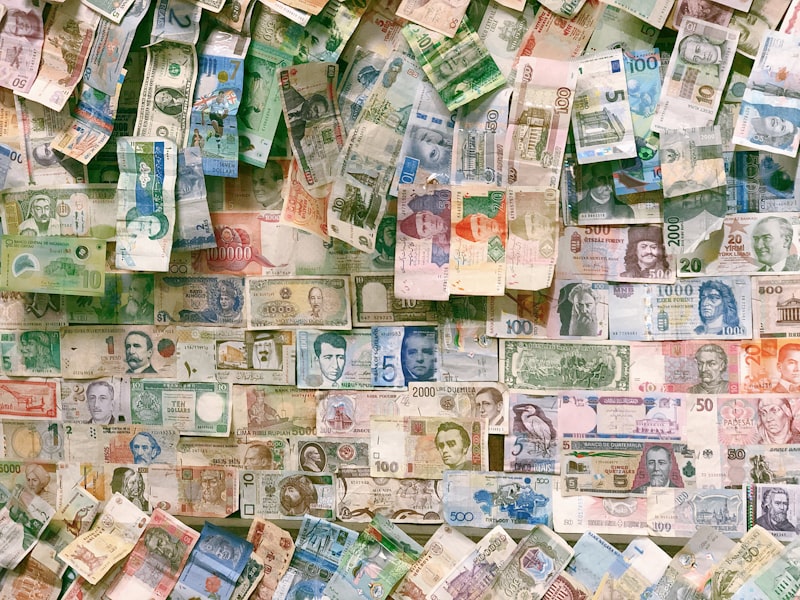Have you ever wondered about the currency known as yen? Well, let’s dive into its origins and discover which country uses it. The yen is the official currency of Japan, a fascinating country in East Asia. Renowned for its rich cultural heritage, advanced technology, and delicious cuisine, Japan is a nation that leaves visitors in awe.
The word “yen” itself has an interesting etymology. It derives from the Chinese character “yuan,” which means “round object” or “circle.” This reflects the shape of the traditional Japanese coins used in the past. Today, the yen is represented by the symbol “¥.”
Since the late 19th century, the yen has been the primary currency in Japan. It plays a crucial role in the nation’s economy and is widely accepted as a medium of exchange. Just like any other currency, the value of the yen fluctuates in response to various factors such as economic conditions, interest rates, and geopolitical events.
One unique aspect of the yen is its denominations. Currently, there are four common banknotes in circulation: ¥1,000, ¥2,000, ¥5,000, and ¥10,000. Alongside these, there are six coins: ¥1, ¥5, ¥10, ¥50, ¥100, and ¥500. Each denomination features iconic Japanese symbols, historical figures, or natural landmarks, making them visually appealing.
The yen’s prominence extends beyond Japan’s borders. In fact, some businesses and retailers in neighboring countries, especially those with significant trade ties to Japan, may accept yen as a form of payment. However, it’s worth noting that the yen is not considered legal tender outside Japan.
The yen is the currency of Japan. Its deep-rooted history, distinctive denominations, and importance in the Japanese economy make it an integral part of the country’s identity. So, whether you’re planning a trip to Japan or simply curious about global currencies, understanding the yen is certainly fascinating.
Japan’s Mighty Yen: Unveiling the Currency Behind the Land of the Rising Sun
Have you ever wondered about the powerful currency that drives Japan’s economic prowess? Step into the world of the mighty yen, the currency behind the Land of the Rising Sun. In this article, we will delve into the fascinating details of the Japanese yen and its significance.
The yen, denoted by the symbol ¥, is not only a medium of exchange but also a symbol of Japan’s economic strength and stability. It has a rich history dating back to the late 19th century when it replaced the previous currency system. Since then, the yen has flourished and become one of the most traded currencies globally.
What makes the yen stand out in the realm of currencies? Well, Japan’s reputation as a global economic powerhouse plays a major role. The country’s advancements in technology, manufacturing, and innovation have established Japan as a key player in the global economy. As a result, the yen holds considerable value, making it an attractive choice for foreign investors and traders.
Furthermore, the Bank of Japan, the country’s central bank, plays a crucial role in maintaining the stability of the yen. Through its monetary policies, the bank regulates interest rates, controls inflation, and ensures the smooth functioning of the financial system. This proactive approach has cemented the yen’s position as a safe and reliable currency for international transactions.
The yen’s strength also stems from Japan’s robust export-oriented economy. The nation is known for its high-quality automobiles, electronics, and machinery, which are in demand worldwide. As these goods are exported, they generate revenue in yen, boosting the currency’s value and reinforcing its prominence in global markets.
However, it’s important to note that a strong yen can have both positive and negative implications for Japan’s economy. While it enhances purchasing power and reduces the cost of imported goods, it can also make Japanese exports relatively more expensive, potentially impacting the country’s export-driven growth.
Japan’s mighty yen is a testament to the nation’s economic prowess and global influence. Its strength and stability make it an attractive currency for investors and traders alike. Supported by Japan’s technological advancements, robust economy, and proactive monetary policies, the yen continues to play a significant role in the international financial landscape. So, next time you hear about the yen, remember its far-reaching impact on the Land of the Rising Sun.
The Yen: A Symbol of Japan’s Economic Powerhouse
Have you ever wondered about the currency that represents Japan’s economic might? Look no further than the yen. The yen is more than just a monetary unit; it is a symbol of Japan’s economic powerhouse and global influence.
The history of the yen dates back to the late 19th century when Japan underwent a period of rapid modernization and industrialization. As the country grew economically, so did its need for a stable and reliable currency. In 1871, the Japanese government introduced the yen as the official currency, replacing the previous monetary systems in place.
Today, the yen stands tall as one of the world’s major currencies. Its status is bolstered by Japan’s position as the third-largest economy globally, known for its technological prowess, innovation, and exports. The yen has become a key player in international trade and finance, with its value influencing markets worldwide.
The strength of the yen lies not only in Japan’s economic might but also in its unique characteristics. The Bank of Japan, the country’s central bank, plays a crucial role in maintaining the stability of the currency. Through monetary policies and interventions, the bank aims to ensure the yen’s competitiveness and foster export growth. This approach has helped Japan maintain a trade surplus and strengthen its economic standing.
Moreover, the yen’s resilience during times of global financial crises further highlights its significance. Investors often view the yen as a safe-haven currency, seeking refuge in its stability during turbulent times. This perception adds to the yen’s allure and reinforces its reputation as a symbol of Japan’s economic strength.
The yen is much more than a currency; it embodies Japan’s economic prowess and global influence. From its historical beginnings to its current status as a major player in international trade and finance, the yen stands as a symbol of Japan’s economic powerhouse. Its unique characteristics and resilience further solidify its position as a symbol of stability in an ever-changing financial landscape.
From Samurai to Satoshi: Unraveling the Journey of the Japanese Yen


Have you ever wondered about the fascinating journey of the Japanese yen? This currency, steeped in history and tradition, has evolved through centuries, embracing changes and shaping Japan’s economic landscape. Join me on a captivating exploration as we unravel the story of the Japanese yen, from its origins rooted in samurai culture to its digital transformation in the age of Satoshi Nakamoto.
Centuries ago, during the feudal era of Japan, samurai warriors roamed the land. These noble warriors played a crucial role in shaping the country’s history. In those times, currencies were not standardized, and various types of coins were in circulation. It was during the Edo period that the concept of the yen emerged. The word “yen” itself means “round object” or “circle,” reflecting the shape of the coins that were minted.
Fast forward to the Meiji era in the late 19th century, Japan underwent a remarkable transformation. The nation embraced modernization, and with it came the establishment of a national currency. In 1871, the Japanese government introduced the yen as the official currency, replacing the previous complex monetary system. The yen became a symbol of Japan’s growing presence on the global stage.
Throughout the 20th century, the yen witnessed both triumphs and challenges. It weathered the storms of World War II and experienced periods of economic growth, establishing Japan as an industrial powerhouse. The yen also faced fluctuations in value, influenced by factors such as inflation, interest rates, and international trade dynamics.
The advent of the digital age brought about new opportunities and innovations. Enter Satoshi Nakamoto, the mysterious creator of Bitcoin, a groundbreaking cryptocurrency. While not directly related to the Japanese yen, Bitcoin and other cryptocurrencies have sparked a revolution in digital currencies. Satoshi Nakamoto’s vision has inspired many across the globe, including Japan, to explore the potential of digital currencies.
In recent years, Japan has embraced cryptocurrencies and blockchain technology. It has become a global leader in cryptocurrency adoption, with businesses accepting Bitcoin as a form of payment. The concept of a decentralized currency resonates with the Japanese spirit of innovation and progress.
Today, as we stand at the crossroads of tradition and technology, the journey of the Japanese yen continues. It represents not only the economic vitality of Japan but also the resilience and adaptability of a nation that cherishes its heritage while embracing the future. The story of the Japanese yen is a testament to the enduring power of currency to shape societies and mirror the ever-changing world around us.
Join me on this incredible journey, where samurai warriors, historical transformations, and digital pioneers converge, creating a captivating tale of the Japanese yen.
Behind the Scenes: The Factors Influencing the Value of the Yen in Global Markets
Have you ever wondered what drives the value of the yen in global markets? It’s a fascinating world behind the scenes, where various factors come into play, influencing this highly traded currency. In this article, we’ll delve into the key elements that shape the value of the yen and impact its standing in the global financial landscape.
One crucial factor affecting the yen’s value is the economic performance of Japan. As one of the world’s largest economies, any shifts in its economic indicators can have a significant impact on the currency’s value. Factors such as GDP growth, inflation rates, and employment data all contribute to the perception of how well the Japanese economy is faring. Positive economic outlooks attract investors, leading to an increase in demand for the yen and subsequently driving up its value.
Another influential force is monetary policy. The Bank of Japan plays a vital role in setting interest rates, which directly affects the yen. When interest rates are low, it encourages borrowing and investment, stimulating the economy but potentially devaluing the yen. Conversely, higher interest rates may strengthen the yen by making it more attractive to investors seeking higher returns.
Global market dynamics also play a role. Currencies are interconnected, and fluctuations in other major currencies like the US dollar and the euro can ripple through the forex market, impacting the yen. For instance, if the US dollar strengthens against the yen, it could lead to a decline in the yen’s value relative to other currencies.
Political stability and geopolitical events are additional factors influencing the yen. Uncertainty or unrest can result in a flight to safe-haven currencies like the yen, bolstering its value. Conversely, political instability or adverse events can erode confidence, causing the yen to weaken.
Lastly, investor sentiment and market speculation contribute to the yen’s volatility. Traders and investors constantly assess the risks and potential rewards of holding yen, based on both fundamental analysis and market sentiment. News, trends, and economic forecasts all influence their decisions, leading to fluctuations in the currency’s value.
A multitude of factors come together to determine the value of the yen in global markets. From economic performance and monetary policy to global market dynamics, political stability, and investor sentiment, each element plays its part in shaping the fate of this influential currency. Understanding these behind-the-scenes forces can provide valuable insights for investors and enthusiasts alike, as they navigate the exciting world of foreign exchange trading.